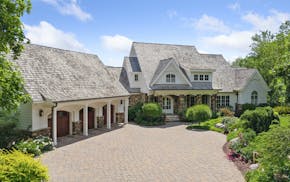Johnny Opara is starting to make a mark in the real estate development industry by concentrating on affordable housing.
A $23.4 million affordable housing complex in Brooklyn Center opened earlier this month. A third of the 54 units in the four-story Wangstad Commons will house Minnesotans who are disabled or at high risk of homelessness. The remaining units will be rented by middle- and low-income tenants.
More affordable housing projects are in the works for JO Cos., including the Heights in East St. Paul and Penn Station Apartments in Richfield, he said. Those projects are expected to deliver 1,000 homes and housing units in conjunction with Habitat for Humanity and Sherman Associates by 2026.
In all, JO Cos. has about $200 million in its real estate development pipeline.
"The development of affordable multifamily housing is one of our top priorities," said Opara, who is a member of the Minnesota Housing Partnership. "We believe everyone has the right to live in a safe, high-quality and equitable place."
About 62% of Wangstad Commons is leased, and a few families have already moved in.
"It's just so exciting to see families and individuals moving into Wangstad Commons," Opara said, noting that the complex has a community room, a business center, gym, underground parking, a kids' room, granite countertops, solid doors and supportive services.
"This investment we've made really changes the narrative surrounding what does affordable housing feel and look like," said Opara, who decided to jump into real estate development after a corporate career in sales and management. "That's really my passion."
Of Brooklyn Center's 32,000 residents, 11.5% live in poverty, according to the U.S. Census. But the city isn't the only one struggling to provide housing that working-class residents can afford. The Wilder Foundation estimates that 10,522 Minnesotans were homeless on any given night in 2023.
Opara said that in 2017, he refocused his business to prioritize affordable housing projects and develop properties that help people improve their lives.
Wangstad Commons, at the corner of 61st Avenue and Brooklyn Boulevard, was completed this year with help from several key players.
U.S. Bank issued Opara's JO Cos. a $16 million construction loan and separately purchased Minnesota Housing low-income housing tax credits. The Greater Minnesota Housing Fund provided a permanent mortgage, construction bridge loan and a tax-increment financing tax loan. Hennepin County contributed $1 million toward the project, Opara said.
The project is the second supportive housing effort that Opara's 15-year-old firm undertook with help from U.S. Bank. The first was the $18.4 million, 62-unit project in St. Paul called the Hollows.
U.S. Bank used its Impact Capital program to assist with both projects. The bank's $250 million tax credit equity and debt fund is designed to help first-time developers and developers of color with tax credit awards. Opara is Black.
The bank was "pleased to help finance Wangstad Commons" because it helps provide access to more affordable housing in the Twin Cities and "we believe everyone deserves a place to call home," said U.S. Bank's Impact Capital Manager Miranda Walker. "JO Companies is a valued client and we appreciate the impact Johnny and his team are making on the community."

From lakeside getaways to urban oases, here are the 2025-26 Home of the Month winners
Rural Minnesota doctors find patients open to off-site gun storage as suicide prevention

Bloomington home with luxuries including multilevel pool and theater lists at $3.29M
